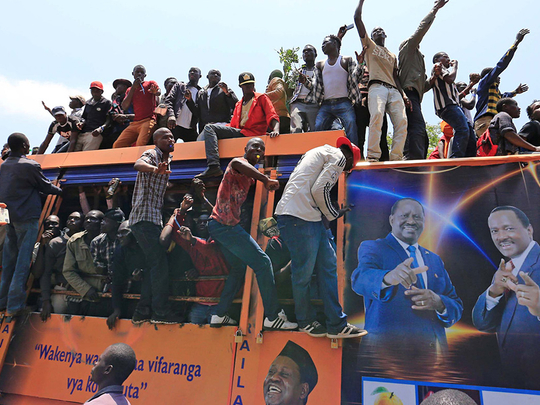
Nairobi: Kenya is lurching towards a constitutional crisis as a stand-off deepens between the two presidential candidates over how to manage a rerun of last month’s botched election.
Both sides have entrenched their positions: Raila Odinga’s opposition coalition has called mass protests starting Tuesday to demand the electoral commission is overhauled before the vote, while President Uhuru Kenyatta’s ruling party rejects any changes to the authority and says the ballot must take place by the end of October. The impasse raises the risk that the election will not happen at all, a situation the constitution does not envisage.
“If the parties retain their hard-line stances, there will be a constitutional crisis,” Charles Kanjama, managing partner at Muma & Kanjama Advocates, said in an interview Monday in the capital, Nairobi. “It’s very important that all political actors show sobriety and realise that the country can’t afford their political games, endangering our peace and security.”
The uncertainty about the election outcome has unnerved investors in Kenyan assets, with yields on its Eurobonds rising 44 basis points since the September 1 court ruling to 6.46 per cent on Monday. The shilling has weakened 0.3 per cent against the dollar in the period.
Previous disputes over elections in Kenya have led to violence, the most serious being in 2007, when clashes left more than 1,100 people dead and forced 350,000 more to flee their homes. That resulted in growth slumping to 1.7 per cent in 2008 from 7.1 per cent a year earlier.
Outlook clouded
The rerun became necessary after the Supreme Court annulled the vote after finding the Independent Electoral & Boundaries Commission failed to conduct it in line with the Constitution. The new vote is clouding the outlook for an economy that is already slowing and risks tainting its reputation as one of Africa’s top investment destinations. Kenya is a regional hub for companies including General Electric Co. and Coca-Cola Co.
The commission has yet to announce how it will deal with the opposition’s demands to reconstitute its management. Nor has it responded to the court’s detailed written judgement delivered on September 21 that faulted the commission for declaring the vote result without the correct documentation.
The protests Odinga’s alliance plans may escalate if Kenyatta’s Jubilee Party carries out a threat to curb the judiciary’s powers, Norman Magaya, the head of the opposition’s secretariat, said by phone on Monday. The commission plans to meet representatives of both candidates on Wednesday, he said.
‘Way forward’
While Kenyatta has said he will abide by the Supreme Court ruling, he has criticised the decision, labelling the judges as “crooks” and their judgement “a judicial coup”. Jubilee senators plan to propose changes that will make it almost impossible for the court to void future elections, the Nairobi-based Star reported on September 23.
“All parties need to sit together and formulate a way forward,” said Tushar Kanti Saha, a professor of law at Kenyatta University in Nairobi. “But parties don’t seem to want to meet.”
While Odinga demanded that new ballot paper suppliers be selected, the commission said Monday that it will stick with a Dubai-based printinting press, whose contract for last month’s vote was challenged in court before finally being allowed. In a letter to the opposition, the IEBC also said it is retaining the services of Paris-based OT-Morpho to provide two electronic systems for the rerun.
The United Nations Development Programme offered to procure ballot papers and results forms for the poll, which the IEBC has asked the Treasury to consider, commission Chairman Wafula Chebukati said in the letter. The vote would be managed by a “fresh presidential election implementation team,” he said.
Constitutional objection
While the Supreme Court did not find any wrongdoing by any of the IEBC’s staff, Odinga says commission employees including the chairman, chief executive officer and eight others should be removed for their complicity.
If the October 26 vote does go ahead, the opposition may resort to a constitutional clause to ensure the vote is invalidated. The constitution states that the election must take place in all 290 constituencies, and it only has to ensure the vote doesn’t happen in two or three of its strongholds to seek another annulment, said Samuel Mohochi, executive director of the Kenyan section of the International Commission of Jurists.
“If the IEBC was to continue preparing as if its business as usual, it would be demonstrating it’s operating without due regard to the constitution,” he said. “It would be an unfortunate scenario because then the stalemate will persist.”












